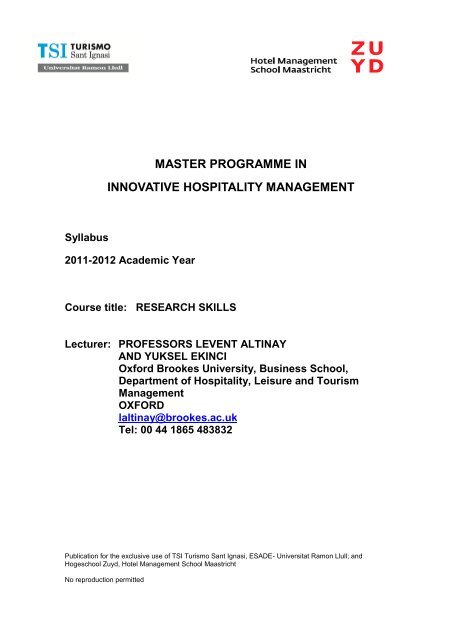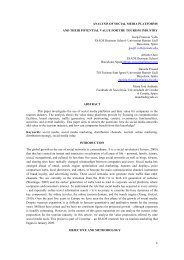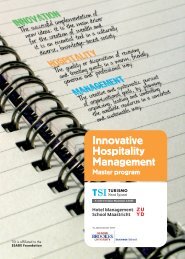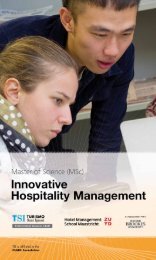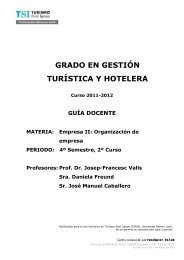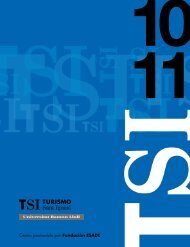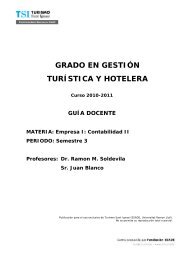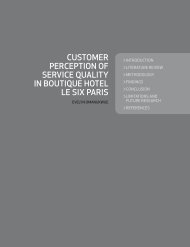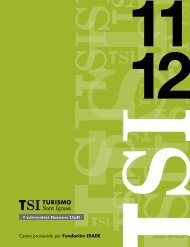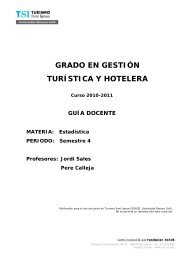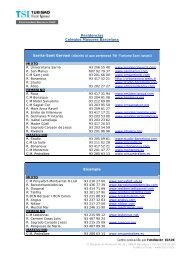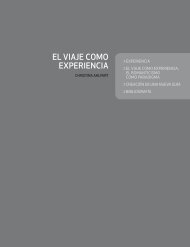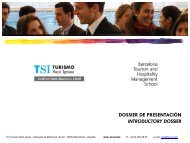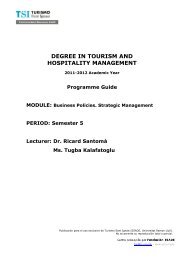In-company Project and Master Thesis - TSI-Turismo Sant Ignasi ...
In-company Project and Master Thesis - TSI-Turismo Sant Ignasi ...
In-company Project and Master Thesis - TSI-Turismo Sant Ignasi ...
You also want an ePaper? Increase the reach of your titles
YUMPU automatically turns print PDFs into web optimized ePapers that Google loves.
MASTER PROGRAMME IN<br />
INNOVATIVE HOSPITALITY MANAGEMENT<br />
Syllabus<br />
2011-2012 Academic Year<br />
Course title: RESEARCH SKILLS<br />
Lecturer: PROFESSORS LEVENT ALTINAY<br />
AND YUKSEL EKINCI<br />
Oxford Brookes University, Business School,<br />
Department of Hospitality, Leisure <strong>and</strong> Tourism<br />
Management<br />
OXFORD<br />
laltinay@brookes.ac.uk<br />
Tel: 00 44 1865 483832<br />
Publication for the exclusive use of <strong>TSI</strong> <strong>Turismo</strong> <strong>Sant</strong> <strong>Ignasi</strong>, ESADE- Universitat Ramon Llull; <strong>and</strong><br />
Hogeschool Zuyd, Hotel Management School Maastricht<br />
No reproduction permitted
COURSE: Research Skills<br />
CODE: O2 RM<br />
MASTER PROGRAMME – COURSE SYLLABUS<br />
COURSE TYPE: Compulsory YEAR: 2011/2012<br />
ECS CREDITS: 5 ECS<br />
BLOCK: Barcelona/Maastricht<br />
LECTURER: Prof Levent Altinay<br />
1. General description of the course.<br />
Students on the <strong>Master</strong>’s programme in <strong>In</strong>novative Hospitality Management will be<br />
expected to undertake effective research drawing upon a range of primary <strong>and</strong> secondary<br />
data sources in the preparation of coursework. Research skills are therefore of general<br />
relevance to all <strong>Master</strong>’s modules. It is important that students are exposed to a range of<br />
generic methodological issues, techniques <strong>and</strong> study skills. The Research Skills module<br />
is particularly geared towards preparation for, <strong>and</strong> successful completion of, high quality,<br />
rigorous <strong>and</strong> systematic management research required for a project <strong>and</strong> is of general<br />
relevance to the successful completion of coursework.<br />
2. Competencies developed within the course (as in the competencies<br />
distribution chart).<br />
Type<br />
General<br />
Specific<br />
Basic<br />
Name<br />
CC5 Ethics <strong>and</strong> social responsibility commitment.<br />
CC6 Problem solving<br />
CC7 Research design<br />
CC8 <strong>In</strong>formation management <strong>and</strong> research<br />
CC9 Analysis <strong>and</strong> synthesis of data<br />
CC10 Writing research reports<br />
SC5 Enhancing the hospitality experience.<br />
BC1 Demonstrate knowledge <strong>and</strong> underst<strong>and</strong>ing.<br />
BC2 Apply knowledge <strong>and</strong> underst<strong>and</strong>ing <strong>and</strong> problem solving abilities.<br />
BC3 <strong>In</strong>tegrate knowledge, h<strong>and</strong>ling complexity <strong>and</strong> formulate<br />
judgements.<br />
BC4 Communicate their conclusions, <strong>and</strong> the knowledge <strong>and</strong> rationale<br />
underpinning these.<br />
BC5 Have the learning skills to continue to study in a manner that may<br />
be largely self-directed or autonomous.<br />
3. Content.<br />
The nature of hospitality management research – Exploration of the purposes of<br />
hospitality management research <strong>and</strong> its uniqueness, differences <strong>and</strong> similarities<br />
between research <strong>and</strong> consultancy, the knowledge type of skills <strong>and</strong> underst<strong>and</strong>ing<br />
required to undertake research. Overviews of the research process <strong>and</strong> its iterative<br />
nature.
Epistemologies <strong>and</strong> practices within management research – The importance of theory<br />
<strong>and</strong> the links between theory <strong>and</strong> practice, different research philosophies, inductive <strong>and</strong><br />
deductive research approaches. The implications of different strategies for research (for<br />
example: experiment, survey, case study, action research, grounded theory <strong>and</strong><br />
ethnography).<br />
Developing the MSc dissertation proposal – Techniques for generating <strong>and</strong> refining<br />
dissertation ideas, developing dissertation proposals to meet organisational <strong>and</strong><br />
academic needs, negotiating organisational access, ethical considerations <strong>and</strong> ethical<br />
codes.<br />
Literature <strong>and</strong> search skills – Planning <strong>and</strong> undertaking a literature search, use of on-line<br />
abstracting tools <strong>and</strong> databases including data archives, CD-ROM databases, uses of<br />
academic <strong>and</strong> practitioner literature, critical reading <strong>and</strong> referencing skills. Writing-up the<br />
results of the search in the form of a literature review.<br />
Methods for data collection – Populations <strong>and</strong> samples, the use <strong>and</strong> implications of<br />
probability <strong>and</strong> non-probability sampling techniques, issues of sample size <strong>and</strong><br />
generalisability. Sources of secondary data. The uses of secondary data. Techniques<br />
for collecting primary data including: observation focus groups, interviews (structured,<br />
semi-structured <strong>and</strong> in-depth) <strong>and</strong> questionnaires.<br />
Methods for data analysis – Preparing data for analysis, including using a range of<br />
analysis software (e.g. spreadsheets, databases, word processors). Quantitative analysis<br />
techniques to explore present <strong>and</strong> underst<strong>and</strong> data, including graphical techniques,<br />
statistical techniques (e.g. measures of central tendency <strong>and</strong> dispersion, parametric <strong>and</strong><br />
non-parametric tests, time series analysis). Qualitative analysis techniques to explore<br />
<strong>and</strong> underst<strong>and</strong> data including pattern-matching <strong>and</strong> explanation-building.<br />
Presentation of research findings – The differing requirements of organisational <strong>and</strong><br />
academic audiences, the need for critical evaluation. Critical writing, <strong>and</strong> skills <strong>and</strong><br />
techniques for extended writing for dissertations.<br />
4. Course objectives.<br />
a) Related to competencies.<br />
To facilitate the generation of high quality, rigorous <strong>and</strong> systematic research as part of<br />
which the students have reflected critically on the theoretical <strong>and</strong> philosophical<br />
assumptions underpinning the process alongside the ethics of undertaking management<br />
research.<br />
To allow students to undertake a self-managed process of systematic enquiry within the<br />
domain of international tourism <strong>and</strong> hospitality management.<br />
b) Related to content.
By the end of the module, students should be able to:<br />
a) Recognise <strong>and</strong> critically evaluate approaches to business <strong>and</strong> management<br />
research <strong>and</strong> the assumptions upon which they are based.<br />
b) Develop a structured programme of research in pursuit of the <strong>Master</strong>s <strong>Project</strong><br />
based upon informed choices about the methodological approaches to be<br />
followed.<br />
c) Conduct the research in a systematic rigorous yet critically reflective manner.<br />
d) Synthesise data from a wide variety of sources within an acceptable dissertation<br />
format.<br />
Students should be able to develop the following transferable skills as well:<br />
Report writing, presentation skills, critical thinking, problem solving <strong>and</strong> decision making,<br />
managing self <strong>and</strong> self-development, research skills, information technology.<br />
5. Required readings<br />
Author/s (year) Altinay, L. <strong>and</strong> Paraskevas, A. (2008).<br />
Title (pages)<br />
Planning Research in Hospitality <strong>and</strong> Tourism<br />
Publisher. City. Butterworth-Heinemann: Oxford.<br />
Comments<br />
This is the core text which offers a balanced approach<br />
regarding the theory <strong>and</strong> practice of research methods,<br />
so that you will be equipped with the knowledge <strong>and</strong> the<br />
skills necessary to perform research <strong>and</strong> justify your<br />
approach to it.<br />
Author/s (year) Saunders, M. N. K., Lewis, P. <strong>and</strong> Thornhill, A. (2008)<br />
Title (pages)<br />
Research Methods for Business Students. (4th ed.)<br />
Publisher. City. Financial Times, Prentice Hall: Harlow.<br />
Comments<br />
This is a more advanced level research methods book<br />
which could offer you detailed information about the data<br />
collection <strong>and</strong> analysis techniques.<br />
Author/s (year) Easterby-Smith, M., Thorpe, R., <strong>and</strong> Lowe, A. (1991).<br />
Title (pages)<br />
Publisher. City.<br />
Comments<br />
Management Research: an <strong>In</strong>troduction<br />
Sage, London.<br />
This book introduces the key philosophies underpinning<br />
different research methodologies, approaches <strong>and</strong><br />
techniques.<br />
6. Exercises <strong>and</strong> assessments<br />
Type Title Extension Dates<br />
<strong>In</strong> Class<br />
Exercise (Not<br />
Defining The Parameters of Your Research<br />
September,<br />
2011
assessed)<br />
<strong>In</strong> Class<br />
Exercise (Not<br />
assessed)<br />
<strong>In</strong> Class<br />
Exercise (Not<br />
assessed)<br />
<strong>In</strong> Class<br />
Exercise (Not<br />
assessed)<br />
<strong>In</strong> Class Test<br />
(10 % of the<br />
overall<br />
assessment)<br />
Research<br />
Proposal (20<br />
% of the<br />
overall<br />
assessment)<br />
How to read an academic paper<br />
How to conduct <strong>and</strong> write the literature<br />
review<br />
Critique of an academic paper<br />
This multiple choice test will assess your<br />
research methodology knowledge <strong>and</strong><br />
underst<strong>and</strong>ing<br />
Research Proposal will be assessed using<br />
the following criteria:<br />
<br />
<br />
<br />
<br />
<br />
Extent to which the subject falls<br />
within the domain of the programme<br />
Extent to which the working title<br />
represents the dissertation subject<br />
Background, academic context <strong>and</strong><br />
links to appropriate literature<br />
Clarity of research objectives<br />
Feasibility of method or methods that<br />
will be adopted to achieve the<br />
dissertation objectives including<br />
issues of access<br />
September,<br />
2011<br />
September,<br />
2011<br />
September,<br />
2011<br />
January, 2012<br />
(Maastricht)<br />
Deadline for<br />
submission is<br />
one month<br />
after the<br />
placement<br />
starts.<br />
<br />
<br />
Research ethics.<br />
Appropriateness of the intended time<br />
scale <strong>and</strong> resources required.<br />
<strong>In</strong> Company<br />
<strong>Project</strong><br />
This is the largest piece of work on the<br />
programme. It assesses students’ abilities to<br />
read <strong>and</strong> synthesise information from various<br />
sources, develop research instruments,<br />
collect data <strong>and</strong> provide recommendations to<br />
companies by using their time management,<br />
negotiation, writing <strong>and</strong> communication skills<br />
effectively.<br />
Deadline<br />
September<br />
2012<br />
7. Methodology <strong>and</strong> sessions chart.<br />
Session Content Methodology Output<br />
1 Getting Started<br />
1.1. What is Research<br />
<strong>and</strong> Why Do We Do It?<br />
Teacher Presentation <strong>and</strong><br />
Computer Lab Exercise<br />
Electronic Databases<br />
<strong>and</strong> their use in<br />
research<br />
2 Developing<br />
Academic Reading<br />
Teacher Presentation <strong>and</strong><br />
<strong>In</strong>-Class Exercise<br />
Developing ‘effective’<br />
reading skills
Skills<br />
2.1. Why Academic<br />
Reading?<br />
2.2. How Do you Know<br />
you Have a Paper<br />
Worth Reading?<br />
3 Developing<br />
Literature Review<br />
Skills<br />
3.1. Locating the<br />
sources of your<br />
literature<br />
3.2. Defining the initial<br />
parameters of search<br />
3.3. Conducting the<br />
main search <strong>and</strong><br />
filtering the results<br />
3.4. Organising your<br />
Results<br />
3.5. Referencing your<br />
Sources<br />
3.6. Articulating the<br />
research aim<br />
4 Research<br />
Philosophies,<br />
Approaches <strong>and</strong><br />
Strategies<br />
4.1. Research<br />
Philosophies:<br />
Positivism <strong>and</strong><br />
Phenomenology<br />
4.2. Research<br />
Approaches:<br />
Deduction <strong>and</strong><br />
<strong>In</strong>duction<br />
4.3. Quantitative<br />
versus Qualitative<br />
Research<br />
4.4. Research<br />
Strategies<br />
5 Sampling<br />
5.1. What is<br />
Sampling?<br />
5.2. Probability<br />
Sampling<br />
5.3. Non-Probability<br />
Sampling<br />
6 Data Collection<br />
Techniques<br />
6.1. <strong>In</strong>terviews<br />
6.2. Observation<br />
6.3. Questionnaires<br />
Teacher Presentation <strong>and</strong><br />
<strong>In</strong>-Class Exercise<br />
Teacher Presentation <strong>and</strong><br />
Practical Case Study<br />
Assignments<br />
Teacher Presentation <strong>and</strong><br />
Practical Case Study<br />
Assignments<br />
Teacher Presentation <strong>and</strong><br />
<strong>In</strong>-Class activities<br />
Developing a<br />
systematic approach<br />
to literature review<br />
Underst<strong>and</strong>ing<br />
different philosophies<br />
which underpin the<br />
research process<br />
Underst<strong>and</strong>ing how to<br />
select the appropriate<br />
sample from a well<br />
defined population<br />
Underst<strong>and</strong>ing the<br />
appropriateness of<br />
different data<br />
collection techniques<br />
for different research<br />
topics
7 Writing Your<br />
Research Proposal<br />
8 Conducting the<br />
Fieldwork<br />
8.1. Negotiating<br />
Access to<br />
Organisations<br />
9 Analysis of<br />
Qualitative Data<br />
10 Quantitative Data<br />
Analysis<br />
11 Writing Up the<br />
Dissertation/<strong>Project</strong><br />
Teacher Presentation<br />
Teacher Presentation<br />
Teacher Presentation <strong>and</strong><br />
<strong>In</strong>-Class activity<br />
Teacher Presentation <strong>and</strong><br />
Computer Lab exercises<br />
Teacher Presentation<br />
Outlining the<br />
expectations of the<br />
teaching team from a<br />
research proposal<br />
Underst<strong>and</strong>ing the<br />
real life complexities<br />
of conducting the<br />
fieldwork<br />
Underst<strong>and</strong>ing<br />
different approaches<br />
to qualitative data<br />
analysis<br />
Underst<strong>and</strong>ing<br />
different approaches<br />
to qualitative data<br />
analysis<br />
Underst<strong>and</strong>ing<br />
different components<br />
of a project <strong>and</strong> how<br />
to structure it.<br />
8. Learning activities <strong>and</strong> distribution of work load (in student work<br />
hours). 1 ECS = 30 hours student workload.<br />
Workload distribution (For 6 ECS) Hours (approx.)<br />
Lectures 33<br />
Assessments 2<br />
Research proposal 30<br />
Reading <strong>and</strong> study 60<br />
Research 60<br />
Total 180<br />
9. Evaluation procedure.<br />
Your mark for the course consists of four elements: in class test, research<br />
proposal, in <strong>company</strong> project report <strong>and</strong> oral defence.<br />
Evaluation activity % on grade Assessed competencies<br />
<strong>In</strong> Class Multiple Choice Test 10 Assesses research methodology<br />
knowledge <strong>and</strong> underst<strong>and</strong>ing<br />
Research Proposal 20 This assessment helps the<br />
students to ensure that they have<br />
a valid <strong>and</strong> viable dissertation.<br />
Research Written Report (<strong>In</strong><br />
<strong>company</strong> <strong>Project</strong>)<br />
50 This is the largest piece of work<br />
on the programme. It assesses a<br />
student’s ability to undertake a
Research Presentation/Oral<br />
Defense<br />
research project <strong>and</strong> produce<br />
reliable <strong>and</strong> meaningful results.<br />
20 Students are expected to<br />
demonstrate their communication<br />
skills <strong>and</strong> ability to convince the<br />
audience.<br />
10. Literature.<br />
Recommended reading(s):<br />
Core Texts:<br />
Altinay, L. <strong>and</strong> Paraskevas, A. (2008). Planning Research in Hospitality <strong>and</strong> Tourism,<br />
Butterworth-Heinemann: Oxford.<br />
Saunders, M. N. K., Lewis, P. <strong>and</strong> Thornhill, A. (2008) Research Methods for Business<br />
Students. (4th ed.) Harlow: Financial Times, Prentice Hall.<br />
Further reading:<br />
Anderson, J. <strong>and</strong> Poole, M. (1998) Assignment <strong>and</strong> <strong>Thesis</strong> Writing. (3 rd ed.) Chichester:<br />
Wiley.<br />
Arksey, H. <strong>and</strong> Knight, P. (1999) <strong>In</strong>terviewing for Social Scientists. London: Sage.<br />
Becker, H. S. (1986) Writing for Social Scientists: How to Start <strong>and</strong> Finish your <strong>Thesis</strong>,<br />
Book or Article. Chicago: University of Chicago Press.<br />
Branscomb, H. E. (1998) Casting your Net: A Student’s Guide to Research on the<br />
<strong>In</strong>ternet. Boston: Allyn <strong>and</strong> Bacon.<br />
Brotherton, B (ed) (1999), Contemporary Hospitality Management Reseach, Cassell.<br />
Brown, B.R. (2006), Doing your Dissertation in Business <strong>and</strong> Management, London: Sage<br />
Publications.<br />
Bryman, A. (1988) (ed) Doing Research in Organisations. London: Routledge<br />
Bryman, A. (1988) Quantity <strong>and</strong> Quality in Social Research. London: Unwin Hyman.<br />
Bryman, A. (2001) Social Research Methods. Oxford: Oxford University Press.<br />
Clarke, A. <strong>and</strong> Dawson, R. (1999) Evaluation Research: An introduction to principles,<br />
methods <strong>and</strong> practice. London: Sage.<br />
Coghlan, D. <strong>and</strong> Brannick, T. (2001) Doing Action Research in Your Own Organization.<br />
London: Sage.
Denscombe, M. (1998) The Good Research Guide for Small-scale Social Research<br />
projects. Buckingham: Open University Press.<br />
DeVaus, D. A. (2001) Research Design in Social Research, London: Sage<br />
Diamantopoulos. A. <strong>and</strong> Schlegelmilch, B. B. (1997) Taking the Fear out of Data<br />
Analysis. London: The Dryden Press.<br />
Easterby-Smith, M., Thorpe, R., <strong>and</strong> Lowe, A. (1991) Management Research: an<br />
<strong>In</strong>troduction. London: Sage.<br />
Edwards, J. E., Thomas, M. D., Rosenfeld, P. <strong>and</strong> Booth-Kewley, S. (1997) How to<br />
conduct organizational surveys: a step by step guide. Thous<strong>and</strong> Oaks: Sage.<br />
Foddy, W. (1993) Constructing Questions for <strong>In</strong>terviews <strong>and</strong> Questionnaires: Theory <strong>and</strong><br />
Practice in Social Research. Cambridge: Cambridge University Press<br />
Ghauri, P., Grnhaug, K., Kristianslund, I. (1995) Research Methods in Business<br />
Studies. New York: Prentice Hall.<br />
Gill, J. <strong>and</strong> Johnson, P. (1997) Research Methods for Managers. (2 nd ed.) London: Paul<br />
Chapman.<br />
Greenwood, D. J. <strong>and</strong> Levin, M. (1998) <strong>In</strong>troduction to Action Research. Thous<strong>and</strong> Oaks,<br />
CA: Sage<br />
Gummesson, E. (1991) Qualitative Methods in Management Research. Newbury Park:<br />
California: Sage.<br />
Henry, G. T. (1995) Graphing Data: Techniques for Display <strong>and</strong> Analysis. Thous<strong>and</strong><br />
Oaks, CA: Sage<br />
Higgins, R. (1996) Approaches to Research: a h<strong>and</strong>book for those writing a dissertation.<br />
London: Jessica Kingsley<br />
Jankowicz, A. D. (2000) Business Research <strong>Project</strong>s. (3 rd ed.) London: Thompson<br />
Learning.<br />
Kinnear, P. R. <strong>and</strong> Gray C. D. (2000) SPSS for Windows Made Simple -Release 10.<br />
Hove, East Sussex: Psychology Press<br />
Krueger, R. A. (1994) Focus Groups: A Practical Guide for Applied Research. (2 nd ed.)<br />
Thous<strong>and</strong> Oaks, CA: Sage<br />
Lewis-Beck, M. S. (1994), (ed), <strong>In</strong>ternational H<strong>and</strong>books of Quantitative Applications in<br />
the Social Sciences: Volume 6. London: Sage <strong>and</strong> Toppan.<br />
Miles, M. B. <strong>and</strong> Huberman, A. M. (1994) Qualitative Data Analysis: an Exp<strong>and</strong>ed<br />
Sourcebook. (2 nd ed.) Thous<strong>and</strong> Oaks, CA: Sage.
Morgan D. L. (1997) Focus groups as qualitative research. (2 nd ed.) Thous<strong>and</strong> Oaks,<br />
California: Sage.<br />
Oppenheim, A. N. (1992) Questionnaire Design, <strong>In</strong>terviewing <strong>and</strong> Attitude Measurement.<br />
(new edition) London: Pinter.<br />
Orna, E. with Stevens, G. (1995) Managing information for research. Buckingham, Open<br />
University Press.<br />
Patton, M. Q. (1990) Qualitative Evaluation <strong>and</strong> Research Methods. (2 nd<br />
Sage.<br />
ed.) London:<br />
Quinton, S. <strong>and</strong> Smallbone, T. (2006), Postgraduate Research in Business: A Critical<br />
Guide. Sage<br />
Raimond, P. (1993) Management projects: design, research <strong>and</strong> presentation. London:<br />
Chapman & Hall.<br />
Remenyi, D., Williams, B., Money, A. <strong>and</strong> Swartz, E. (1998) Doing Research in Business<br />
<strong>and</strong> Management: an <strong>In</strong>troduction to Process <strong>and</strong> Method. London: Sage.<br />
Robson, C. (2000) Small-Scale Evaluation. London: Sage.<br />
Salant, P. <strong>and</strong> Dillman, D. A. (1994) How to Conduct your own Survey. New York: Wiley.<br />
Sharp, J. A. <strong>and</strong> Howard, K. (1996) The Management of a Student Research <strong>Project</strong>. (2 nd<br />
ed) Aldershot: Gower.<br />
Shaw I. F. (1999) Qualitative evaluation. London, Sage<br />
Smith, N. C. <strong>and</strong> Dainty, P. (1991) The Management Research H<strong>and</strong>book. London:<br />
Routledge.<br />
Stewart, D. W. <strong>and</strong> Kamins, M. A. (1993) Secondary Research: <strong>In</strong>formation Sources <strong>and</strong><br />
Methods. (2 nd ed.) London: Sage.<br />
Strauss, A. & Corbin, J. (1997) (eds) Grounded Theory in Practice. Thous<strong>and</strong> Oaks:<br />
Sage.<br />
Symon, G. <strong>and</strong> Cassell, C, (eds.), (1998), Qualitative Methods <strong>and</strong> Analysis in<br />
Organizational Research: A Practical Guide. London: Sage<br />
Tashakkori, A. <strong>and</strong> Teddlie, C. (1998) Mixed Methodology: Combining qualitative <strong>and</strong><br />
quantitative approaches. Thous<strong>and</strong> Oaks, CA: Sage.<br />
Usunier, J-C. (1998) <strong>In</strong>ternational <strong>and</strong> Cross-Cultural Management. Research.London:<br />
Sage.
Wass, V. J. <strong>and</strong> Wells, P. E. (1994) (eds.) Principles <strong>and</strong> Practice in Business <strong>and</strong><br />
Management Research. Aldershot: Dartmouth.<br />
Zikmund, W. G. (2000) Business Research Methods. (6 th ed.) Fort Worth: Harcourt.<br />
Journals:<br />
Academy of Management Review<br />
Annals of Tourism Research<br />
British Journal of Management<br />
Current Topics in Management<br />
European Journal of Marketing<br />
<strong>In</strong>ternational Journal of Contemporary Hospitality Management<br />
<strong>In</strong>ternational Journal of Hospitality Management<br />
<strong>In</strong>ternational Journal of Operations <strong>and</strong> Production Management<br />
<strong>In</strong>ternational Journal of Organizational Analysis<br />
Journal of Applied Behavioural Science<br />
Journal of Applied Management Studies<br />
Journal of European <strong>In</strong>dustrial Training<br />
Journal of Management Development<br />
Journal of Managerial Psychology<br />
Journal of Marketing Research<br />
Journal of the Market Research Society<br />
Management Accounting Research<br />
Management Decision<br />
Management Learning<br />
Organization Studies<br />
Personnel Review<br />
Regional Studies<br />
Tourism Management
Websites:<br />
Name<br />
Business Zone<br />
Data Archive<br />
FT <strong>In</strong>fo<br />
Hoover’s Online<br />
Statbase<br />
UK Equities Direct<br />
Advertising Association<br />
Advertising St<strong>and</strong>ards Authority<br />
Advisory Conciliation <strong>and</strong> Arbitration<br />
Service<br />
American Marketing Association<br />
Association of Chartered Certified<br />
Accountants<br />
Business Link<br />
Confederation of British <strong>In</strong>dustry (CBI)<br />
Chartered <strong>In</strong>stitute of Bankers<br />
Chartered <strong>In</strong>stitute of Management<br />
Accountants<br />
Chartered <strong>In</strong>stitute of Marketing (CIM)<br />
<strong>In</strong>dustrial Society<br />
<strong>In</strong>stitute of Directors<br />
<strong>In</strong>stitute of Management<br />
Chartered <strong>In</strong>stitute of Personnel <strong>and</strong><br />
Development<br />
<strong>In</strong>stitute of Practitioners in Advertising<br />
(IPA)<br />
KPMG UK<br />
London Stock Exchange<br />
Trade Union Congress (TUC)<br />
Biz/Ed<br />
Human Resource Management Resources<br />
on the <strong>In</strong>ternet<br />
<strong>In</strong>ternet address<br />
http://www.businesszone.co.uk<br />
http://dawww.essex.ac.uk<br />
http://www.info.ft.com/companies<br />
http://www.hoovers.com<br />
http://www.statistics.gov.uk/statbase/mainmen<br />
u.asp<br />
http://194.200.168.251/equities/index.htm<br />
http://www.adassoc.org.uk<br />
http://www.asa.org.uk<br />
http://www.acas.org.uk<br />
http://www.ama.org<br />
http://www.acca.co.uk<br />
http://www.businesslink.co.uk<br />
http://www.cbi.org.uk<br />
http://www.cib.org.uk<br />
http://www.cima.org.uk<br />
http://www.cim.co.uk<br />
http://www.indsoc.co.uk<br />
http://www.iod.co.uk<br />
http://www.inst-mgt.org.uk<br />
http://www.cipd.co.uk<br />
http://www.ipa.co.uk<br />
http://www.kpmg.co.uk<br />
http://www.sets.co.uk<br />
http://www.tuc.org.uk<br />
http://www.bized.ac.uk<br />
http://www.nbs.ntu.ac.uk/staff/lyerj/hrm_link.ht<br />
m<br />
11. Observations.<br />
The Research <strong>Project</strong> is a major component of the <strong>Master</strong>’s programme. It is the largest<br />
single piece of work on the programme, <strong>and</strong> it provides you with the opportunity to<br />
demonstrate what you have learned, what you can do <strong>and</strong> shows whether you have the<br />
ability to work independently. <strong>In</strong> many ways the Research <strong>Project</strong> is the culmination of<br />
the <strong>Master</strong>'s programme <strong>and</strong> of the research methods training you have been undertaking<br />
over the previous two semesters of the programme. It is important therefore that you take<br />
this opportunity to show your abilities to the full <strong>and</strong> do not treat it as just another piece of<br />
coursework.
The key aspects of the <strong>Project</strong> are that it is a sustained, self-directed, independent piece<br />
of work at a high academic level. This means that although you will have guidance from<br />
a supervisor, it will be you that directs <strong>and</strong> leads your <strong>Project</strong>. You will be the one that<br />
schedules the work over a relatively long period of time <strong>and</strong> you will be responsible for<br />
meeting the final submission deadline. Do not make the mistake of thinking that you<br />
can leave the <strong>Project</strong> until the last minute, or even until the summer, you must start<br />
now!<br />
<strong>In</strong> terms of intellectual skills, the examiners will be looking for an in-depth study of a topic<br />
where the underpinning theory <strong>and</strong> current practice can be analysed, evaluated <strong>and</strong><br />
applied to the international hotel <strong>and</strong> tourism industry. They will be looking for evidence<br />
of analysis, evaluation, application, creativity <strong>and</strong> the synthesis of new ideas. Description<br />
<strong>and</strong> the mere regurgitation of theory will not be enough.


